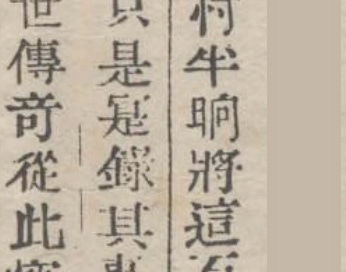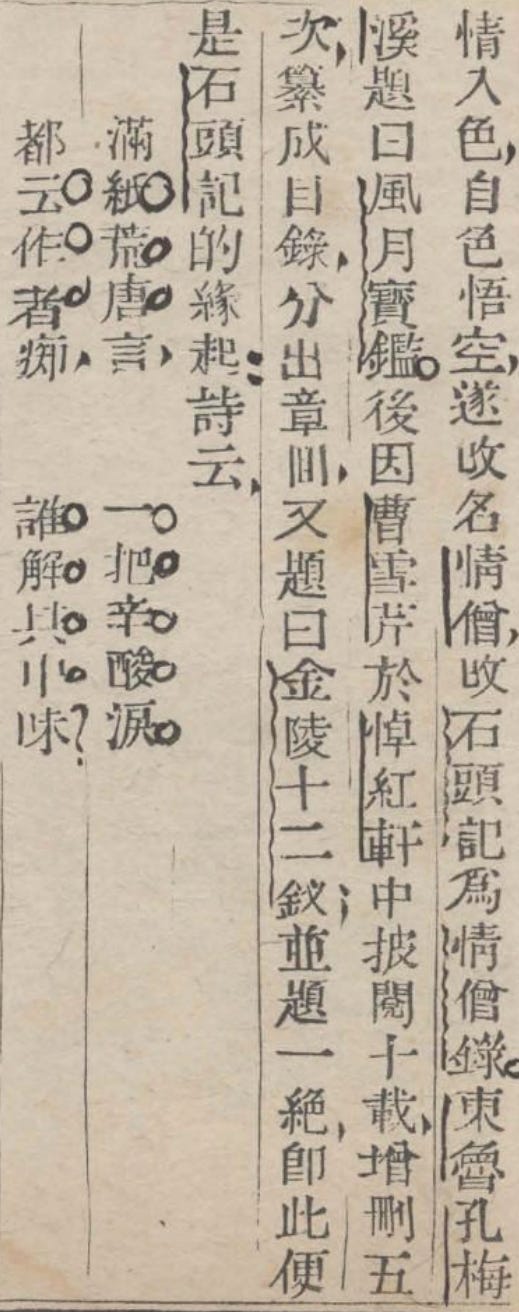The Many Names Of The Book
Cao Xueqin tells us in this passage a mythical story of how his book changed from The Story of the Stone to its current form. Interestingly, the name I’d consider to be the “proper” name of the novel, 紅樓夢 (Dream of the Red Chamber), is nowhere to be found; we won’t encounter it until chapter 5. Cao Xueqin then alludes again to the philosophic nature of his novel. Interestingly enough, Cao Xueqin refers to himself in this section, implying that his role in the text was merely to make corrections for clarity before passing it along.
Chinese Text
空空道人聽如此說,思忖半晌,將這《石頭記》再檢閱一遍。因見上面大旨不過談情,亦只是實錄其事,絕無傷時誨淫之病,方從頭至尾抄寫回來,問世傳奇。從此,空空道人因空見色,由色生情,傳情入色,自色悟空,遂改名情僧,改《石頭記》為《情僧錄》。東魯孔梅溪題曰《風月寶鑑》。後因曹雪芹於悼紅軒中披閱十載,增刪五次,纂成目錄,分出章回,又題曰《金陵十二釵》,並題一絕。即此便是《石頭記》的緣起。詩云:
滿紙荒唐言,一把辛酸淚。都云作者痴,誰解其中味?
Translation Notes
思忖 means to ponder or think deeply.
石頭記 is “the record of the stone,” or “the story of the stone.” This is the name David Hawkes used for his translation of the full book, and is a common alternative name for certain editions of 紅樓夢 in Chinese.
因空見色,由色生情,傳情入色,自色悟空 literally means “through emptiness, perceive form; from form, emotions arise; those emotions are transmitted into form; and from form, emptiness is realized.” This is a cycle of spiritual growth: you start from a state of emptiness, engage with the material world, experience emotions, express those emotions through creative or meaningful actions, and then ultimately transcend the material world to return to a deeper feeling of emptiness. 色 is the hardest character here to decipher: it must mean “form” (from rūpa in Sanskrit, or रूप; see, for example, the Buddhist phrase 色即是空,空即是色, or “form is emptiness, emptiness is form,” a famous passage from the Heart Sutra) for this passage to make any sense.
情僧錄 literally means “The romantic monk’s record.”
Was 孔梅溪 a real person, or is he just another literary device? Was 空空道人 a true person? It’s impossible to tell – but it’s probably good enough to treat them as literary devices used by Cao Xueqin.
風月寶鑑 is pretty easy to decipher. 鑑 is a mirror, and 寶 means “precious.” 風月 is a euphemism for romance that we’ve seen before in this chapter. Hence “the precious mirror of romantic affairs.”
Keep reading with a 7-day free trial
Subscribe to Dream of the Red Chamber to keep reading this post and get 7 days of free access to the full post archives.






